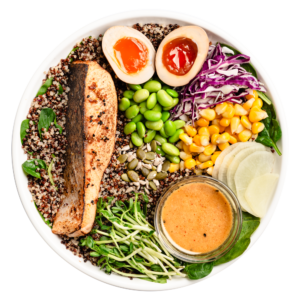In the realm of nutrition, few macronutrients hold as much importance and intrigue as protein. From building blocks for muscles to essential components of various bodily functions, protein plays a crucial role in sustaining overall health and well-being. In this article, we delve into the daily requirements of protein intake and explore the myriad functional nutrition benefits it offers.
Understanding Daily Protein Requirements Based on Different Lifestyles:
Sedentary Lifestyle:
For individuals leading sedentary lifestyles, characterized by minimal physical activity and exercise, the daily protein requirement remains fundamental for supporting basic bodily functions. While the recommended daily intake stands at around 0.8 grams per kilogram of body weight, sedentary individuals may opt for lean protein sources to meet their needs without excess caloric intake.
Active Lifestyle:
Those engaged in moderate to vigorous physical activity require higher protein intake to support muscle repair, recovery, and overall performance. Depending on the intensity and duration of their workouts, active individuals may aim for protein intake ranging from 1.2 to 2.2 grams per kilogram of body weight per day. Incorporating protein-rich foods before and after exercise sessions aids in optimizing muscle protein synthesis and promoting efficient recovery.
Athletic Lifestyle:
Athletes and individuals participating in intense training regimens have significantly elevated protein requirements to meet the demands of their rigorous workouts. Protein serves as a crucial component for muscle repair, growth, and strength maintenance. In such cases, protein intake may exceed 2.2 grams per kilogram of body weight, necessitating strategic meal planning and supplementation to ensure adequate protein provision.
Functional Nutrition Benefits of Protein:
- Muscle Growth and Repair
Protein serves as the building blocks for muscles, making it essential for muscle growth and repair. After strenuous exercise or physical activity, consuming protein helps in repairing damaged muscle tissues and promoting muscle recovery. This is particularly important for athletes and individuals engaged in strength training.
- Satiety and Weight Management
Including protein-rich foods in meals and snacks can help promote feelings of fullness and satiety. Compared to carbohydrates and fats, protein takes longer to digest, which can aid in appetite control and prevent overeating. As a result, incorporating protein into your diet may support weight management efforts by reducing overall calorie intake.
- Metabolism and Energy Production:
Proteins play a vital role in metabolic processes, including the production of enzymes and hormones involved in energy metabolism. Consuming an adequate amount of protein helps support a healthy metabolism and ensures efficient energy production. Additionally, protein can be converted into glucose through gluconeogenesis, providing a source of energy when carbohydrates are limited.
- Immune Function
Many immune cells and antibodies are made up of proteins, highlighting the importance of adequate protein intake for a robust immune system. Consuming protein-rich foods can help support immune function and enhance the body’s ability to fight off infections and illnesses.
- Bone Health
Protein is not only essential for muscle health but also plays a role in maintaining bone density and strength. Collagen, a protein found in bones, provides structural support and helps prevent conditions like osteoporosis. Including sufficient protein in the diet contributes to overall bone health and reduces the risk of fractures and bone-related disorders.
- Hair, Skin, and Nail Health:
Protein is a key component of hair, skin, and nails, contributing to their strength, elasticity, and appearance. Adequate protein intake supports the growth and maintenance of these tissues, promoting healthy hair, glowing skin, and strong nails.
To put it simply, Protein stands as a cornerstone of nutrition, offering a multitude of functional benefits beyond mere muscle building. Whether you’re an athlete striving for peak performance or an individual aiming for overall health and vitality, prioritizing adequate protein intake is essential. By understanding the daily requirements and functional nutrition benefits of protein, you can optimize your diet to support your health and well-being for years to come.
Disclaimer:
At SaladStop! Group, our commitment is to empower every individual with reliable, evidence-based nutritional and wellness guidance. To earn your trust as your ultimate resource for nutritional information, our content undergoes rigorous nutritional scrutiny to ensure its accuracy, whether it’s about our offerings, culinary creations, or services. Please note that all information provided is for informational purposes only and should not be considered a substitute for professional medical or nutritional advice.




